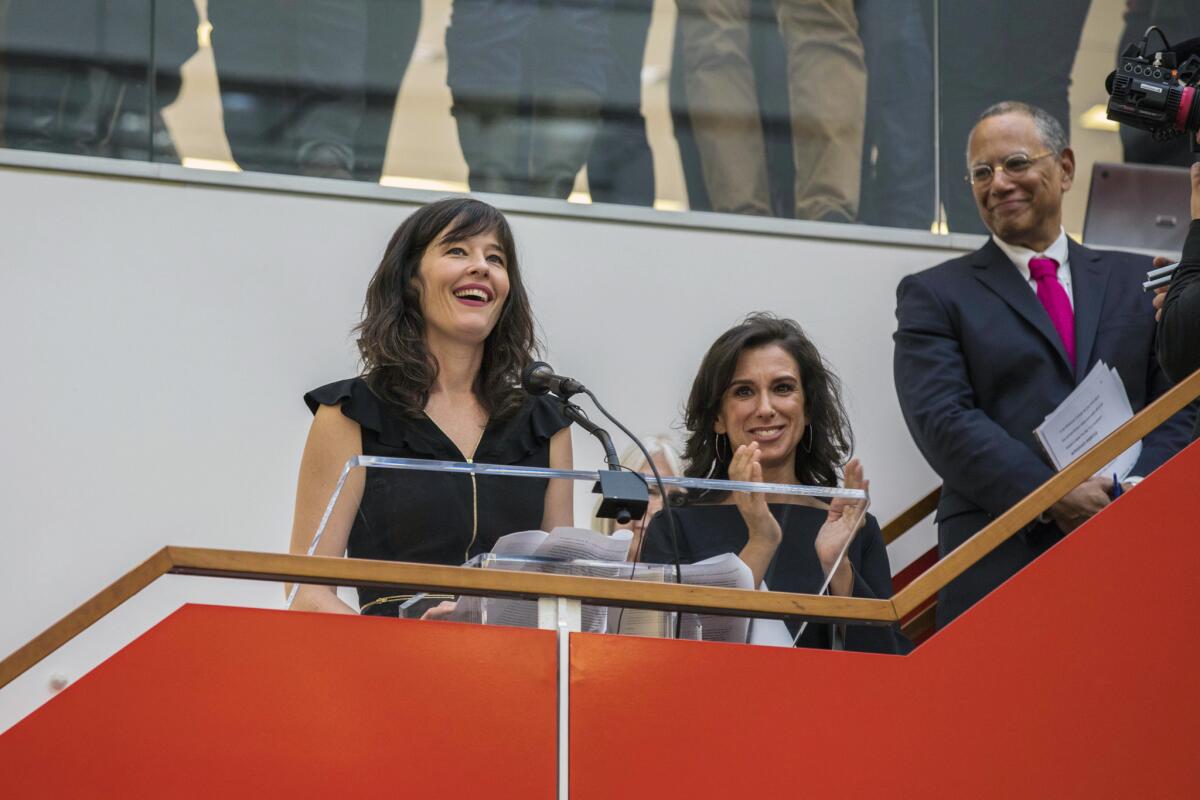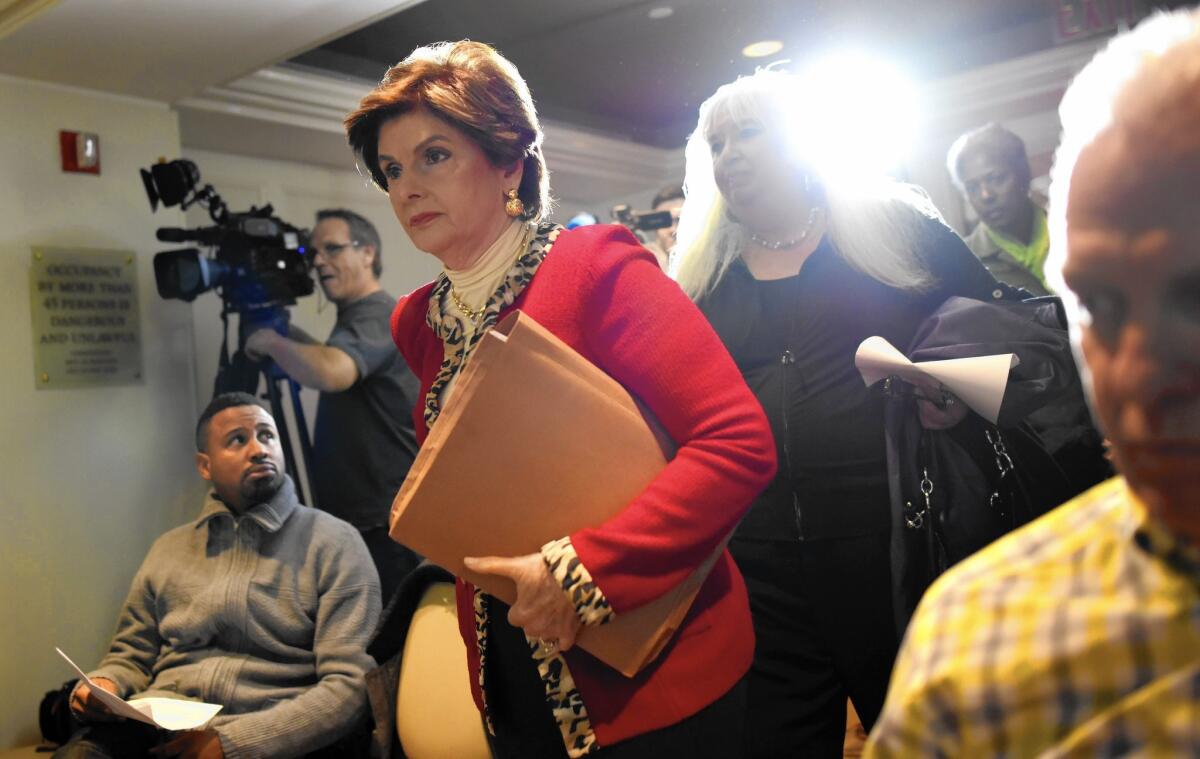Gloria Allred says her New York Times critics ‘don’t understand the practice of law’

- Share via
On Sunday, Lionsgate held a “tastemaker” screening of its new film “Bombshell,” about the women who called out sexual harassment at Fox News. It was a typical awards season event, featuring a Q&A with the movie’s stars — Charlize Theron, Nicole Kidman and Margot Robbie — and a guest list peppered with influencers whose endorsement might help give the film traction. There were rumors Taylor Swift was supposed to attend -- she did not -- but actress Cara Delevingne was there, as was Rodarte co-founder Laura Mulleavy and lawyer Gloria Allred.
On the surface, Allred’s appearance at the Hollywood screening made sense. She has represented dozens of women who have sued powerful men for sexual harassment, though none who publicly spoke out against former Fox News chairman Roger Ailes or network host Bill O’Reilly.
But in the past month, Allred’s reputation as a feminist crusader has come under scrutiny. In their new book “She Said” — and a subsequent podcast episode of The Daily — New York Times journalists Jodi Kantor and Megan Twohey have raised questions about whether the attorney truly has her clients’ best interest at heart. Through their reporting, the journalists argued that Allred was actually part of the problem instead of the solution, pressuring clients to accept secret settlements instead of publicly speaking out against their accusers in court.
In the case of Harvey Weinstein, Kantor and Twohey found, Allred’s firm negotiated a $125,000 settlement for one actress in 2004 — 13 years before Weinstein’s pattern of alleged predation came to light.
But at the “Bombshell” event, Allred said she was unbothered by the negative press. “It hasn’t been intense for me at all. I know what I’m doing is right,” she said, moments after posing with two middle-aged female party guests who had asked for a photograph.
“I felt that, frankly, the New York Times reporters seem to be new to the issue of confidential settlements,” she continued. “I do understand they have a different role than I have. Reporters want to know everything, because that’s their job. I don’t criticize them, because that’s their job. But my job is not to be a member of the press. My job is to put my client first.”
In response to Allred’s comments, Kantor and Twohey said that they had spent more than 2 1/2 years investigating confidential settlements and found “that while they can provide victims of sexual abuse with financial recompense and privacy, they also allow alleged predators to repeatedly cover their tracks and go on to reportedly hurt others,” the reporters wrote in an e-mail. “We are watching closely as legislators in California and elsewhere pursue alternative ways for victims to receive financial recompense that don’t enable predation.”

Allred insisted — as she did in a Los Angeles Times op-ed last week — that she never pressures her clients into accepting settlements. Her job, she said, is to outline the benefits and risks of every option: Do you want to file a public lawsuit and litigate for four or five years — and maybe the jury will side with you? Or do you want a confidential settlement that does not require you to testify in court but may also prohibit you from speaking publicly about the allegations? (Those who enter into such settlements are still able file criminal complaints with the police.)
Most of her clients, Allred said, go the settlement route.
“So yeah, the press is like, ‘That’s not right. They’re not helping other women,’ ” Allred said. “Women are really always socialized to put everybody else first. Put your children first, put your husband first. When do they get to put themselves first? If they can do a confidential settlement, why don’t they get to do that?
“I don’t want women to feel that they always have to sacrifice themselves for something called the greater good. They get to have the greater good for themselves too. They get to have the money to pay their therapy bills and their medical bills and maybe start a new chapter and also have their privacy and go on. They get to make that decision. They’re adults.”
But doesn’t Allred stand a great chance of benefiting financially if her clients accept a settlement? In the case of the Weinstein accuser, Kantor and Twohey reported, Allred’s firm kept 40% of the client’s $125,000 payment. The attorney responded by saying there was not always a financial upside, pointing out that if a case took five years to get to trial, “maybe we’d get a larger verdict.”
“There’s nothing wrong with being paid to represent a client,” she said. “They get paid to write their stories for the New York Times, last time I checked. They didn’t do it for free, did they? I don’t criticize them because they’re getting paid to do a story or sell their book. Fine, God bless them. I hope they make a lot of money. But unfortunately for them, they don’t understand the practice of law. They’re like, ‘We’re shocked there’s gambling in Casablanca!’ They didn’t say that, but that’s it in essence.”
Still, even if a client opts for a settlement — doesn’t it ever bother her that the silence might allow a perpetrator to continue a pattern of harassment?
“I’m not in control of whether they engage in that behavior or not,” Allred said. “When they’ve had to pay the cost of [their wrongdoing] in the settlement, usually it’s a teaching moment for them. It doesn’t mean they’ll never do it again, but it’s something for them to think about.
“And I always believe — and I said this about O.J. Simpson many years ago — he will be the cause of his own destruction. That’s what happened with Bill Cosby. That’s what happened with Harvey Weinstein. That’s what happened with Jeffrey Epstein. R. Kelly. It’s within them. They will fall.”

Allred would not comment on the New York Times reporters’ revelations about her daughter, attorney Lisa Bloom. In “She Said,” Kantor and Twohey publish a memo written by Bloom in which the lawyer laid out a strategy to attack Weinstein accuser Rose McGowan, noting she felt “equipped to help [him] against the Roses of the world, because I have represented so many of them.” (Bloom subsequently released an apology on her Twitter account, thanking the New York Times journalists and Ronan Farrow for forcing her to “confront the colossal mistake” she made in working with Weinstein.)
“She speaks for herself,” Allred said of her daughter. “She said it was a mistake to represent [Weinstein]. Whatever she decides, I love her. She’s a great attorney.”
As for “Bombshell,” which Lionsgate has set for a December release, the lawyer said she thought filmmaker Jay Roach “did a very good job with it,” creating a film with a documentary-like feel that showed the conflict female employees who have been harassed in the workplace often experience.
“Often the press says, ‘Why don’t they come out, why don’t they have a voice, why don’t they tell the story?’ Well, there are lots of reasons,” Allred said. “I have no doubts [when a client takes a settlement] because I know I’ve helped my client and helped them have a new life. I get these emails all the time — ‘Thank you, and here’s what I’m doing with all of this. I’m saving. I’m sending my kids to college. I’m going to college. I’ve started my own business. I’m getting all my therapy. I feel empowered.’
“I feel very encouraged by all of that. I know I’m doing the right thing. It doesn’t matter whether the public knows. The public doesn’t understand that I put the individual first.”
More to Read
The biggest entertainment stories
Get our big stories about Hollywood, film, television, music, arts, culture and more right in your inbox as soon as they publish.
You may occasionally receive promotional content from the Los Angeles Times.











